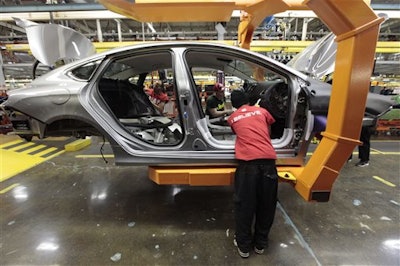
 Mexico has become the most attractive place in North America to build new automobile factories, a shift that has siphoned jobs from the U.S. and Canada, yet helped keep car and truck prices in check for consumers.
Mexico has become the most attractive place in North America to build new automobile factories, a shift that has siphoned jobs from the U.S. and Canada, yet helped keep car and truck prices in check for consumers.
In the past two years, eight automakers have opened or announced new plants or expansions in Mexico. Just last week, Toyota announced a new plant in Guanajuato to build the popular Corolla, work now done in Canada, while Ford unveiled plans for Mexican engine and transmission factories.
Low labor costs and fewer tariffs are the swing factors. A worker in Mexico costs car companies an average of $8 an hour, including wages and benefits. That compares with $58 in the U.S. for General Motors and $38 at Volkswagen's factory in Tennessee, the lowest hourly cost in the U.S., according to the Center for Automotive Research, an industry think tank in Ann Arbor, Michigan. German auto workers cost about $52 an hour.
Mexico also trumps the U.S. on free trade. It has agreements with 45 countries, meaning low tariffs for exporting globally. That, along with low labor costs, convinced Audi to build an SUV factory in the state of Puebla. The German automaker will save $6,000 per vehicle in tariffs when it ships a Q5 to Europe, compared with building the same vehicle in the U.S., says Sean McAlinden, chief economist at CAR.
Audi also sells the Q5 in the U.S., where tariffs on cars built in Mexico were dropped under the North American Free Trade Agreement.
The cost savings also should allow automakers to add expensive fuel-saving features to meet stricter U.S. government gas mileage requirements without raising car prices. Two-thirds of cars made in Mexico are shipped to the U.S.
While Mexico's auto industry booms and workers welcome the above-average wages, they are speaking out more loudly about working conditions.
Mexican auto production more than doubled in the past 10 years. The consulting firm IHS Automotive expects it to rise another 50 percent to just under 5 million by 2022. U.S. production is expected to increase only 3 percent, to 12.2 million vehicles, in the next 7 years.
Automakers now have 18 factories in Mexico, many built in the past 10 years. In four years, five more will be built, moving the country from the world's seventh-biggest auto producer to fifth.
The shift means jobs that could have gone to the U.S. or Canada went south. The number of auto-making jobs in Mexico has risen almost 40 percent since 2008, from 490,000 to 675,000 last year, according to government and industry statistics. During the same period, U.S. auto manufacturing employment grew 15 percent to nearly 903,000.
Toyota's new plant will create 2,000 new jobs, while Ford's $2.5 billion investment will add 3,800 jobs.
For Mexican workers, the plants "originally appear like marvelous places because you can earn a salary in exchange for good work," says Huberto Juarez, a professor at the Center for the Study of Economic and Social Development at the Autonomous University of Puebla.
Some Japanese automaker plants start workers at 90 to 150 pesos per day, or $6 to $10, Juarez says. Others, such as Volkswagen, have paid more than double that. Juarez says Mexico's auto-making wages are now below China, but better than Mexico's minimum wage of $4.50 per day.
There is pressure to improve working conditions at Mexican factories. Last week, three former Mazda factory workers publicly complained of injuries and of being worked longer than legally allowed. A union official announced protests in support.
Even so, Juarez says workers probably will stay put. "The big threat is always going to be unemployment. That's why they stay. Because you leave there and where are you going to go?"
Initially, automakers with Mexican factories faced quality problems due to an unskilled work force. But companies with longtime factories in Mexico, such as Ford and Nissan, have resolved those issues, according to McAlinden.
Despite shipping costs, it's still cheaper to build cars for the U.S. in Mexico, McAlinden says.
A U.S.-built Chevrolet Sonic subcompact costs about $700 more to make than a comparable Mexican-built Ford Fiesta, McAlinden says. That's even with a labor agreement at the Sonic factory in Michigan that allows 40 percent of the workers to be paid lower wages than longtime union employees.
The United Auto Workers complain that companies building in Mexico are taking advantage of "slave-like" wages. "American manufacturing workers could have had good paying jobs that respect basic human dignity," says UAW President Dennis Williams.
Still, the auto industry's investments aren't limited to Mexico. Automakers poured $46 billion into improving U.S. factories from 2010 to 2014. U.S. auto-making employment grew 37 percent during that time.
Ford pointed out that 80 percent of its annual North American investments are in the U.S., where spending "will continue at about the same sizeable level going forward."
Car buyers should see benefits from lower costs in Mexico. U.S. government fuel-economy requirements call for raising mileage of the new car fleet to average 54.5 miles per gallon by 2025. The technologies needed, including turbocharged engines and multi-speed transmissions, are costly. And with gasoline just over $2 per gallon, buyers don't want to pay extra. So McAlinden says moving engine and transmission production to Mexico makes sense.
"There's no room for labor costs," he says.






















